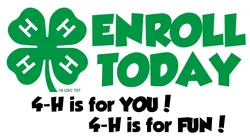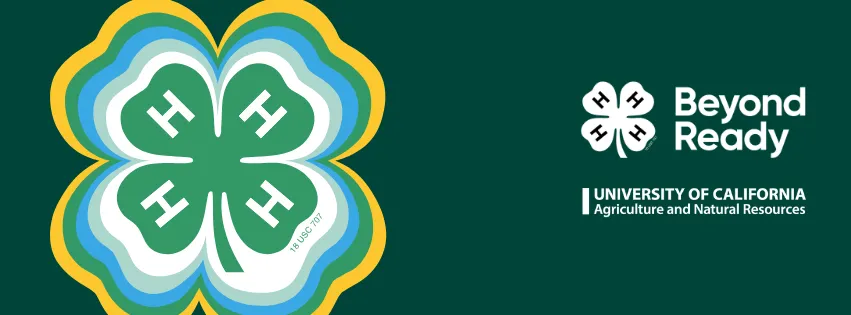
What is Kings County 4-H?
The Kings County 4-H Program helps youth, ages 5-18, reach their fullest potential as competent, confident individuals who contribute to and are connected with their communities.
Using an experiential educational model, 4-H helps youth develop essential skills that they will use throughout their lives, such as identifying and nurturing interests, desiring knowledge, setting goals, self-reflection, adapting to new situations, communicating, and responding to the needs of others.
In 4-H programs, youth serve in leadership roles where they set goals, develop plans, complete projects, and reflect on their experiences. Youth are encouraged to discover their passions, adopt a growth mindset, practice self-reflection and set goals. 4-H projects and programs are focused around civic engagement, healthy living, and STEAM.
Resource: 4-H Handbook for Families
Ways to Participate
There are multiple ways youth and families can participate in the Kings County 4-H Program. Youth can join one, or more, 4-H delivery modes:
4-H Community Clubs: A 4-H community club is an organized group of youth members, supervised by a team of appointed 4-H adult volunteers, with a planned program that is carried out through all or most of the year. 4-H clubs usually meet regularly in the evenings or on weekends and offer multiple self-chosen project learning experiences and activities. 4-H Clubs generally start in September or October and go until May or June. There are six active community clubs in Kings County - one in Lemoore, one in Hanford, and one in Corcoran.
4-H In-School Club: In 2024 Kings County 4-H opened its first In-School 4-H Club at the University Charter School on the Lemoore College Campus. Students grades 6th-8th participate in 4-H programming during the school day by learning about Plant Science through hands-on gardening activities. The school garden includes several raised beds, a green house, and row crops. In the future they hope to expand to include poultry and other animal projects.
4-H Military Club: The NAS Lemoore 4-H Club offers 4-H programs on base to families stationed at the Naval Air Station in Lemoore. This special 4-H Military partnership's mission is to integrate research-based positive youth development programs for military-connected youth and families.
4-H Afterschool Education Programs: Youth receive 4-H curricula such as Cooking Academy or Youth Experiences in Science (YES) during out of school hours programming while under the supervision of afterschool staff. Ask your afterschool organization if they partner with Kings County 4-H to learn more!
4-H Teens as Teachers Programs: Teens are coached and supported by 4-H and Expanded Learning adult staff as they work in teams to plan and deliver 4-H lessons to students in an afterschool education setting. Teens receive tangible career readiness training and exposure to workplace standards as they develop workplace skills, leadership skills and confidence, and a sense of service as they contribute to and connect with their community.
4-H Short-Term Programs: Youth participate in a self-chosen project learning experience that allows them to experience a 4-H project in a topic area that interests them. Short-Term programs could be weekly projects, day-camps, or one-day skill-building workshops. Short-term programs may be offered throughout the 4-H Program Year (July- June), but often take place in the spring (April-June).
4-H Overnight Leadership Conferences: Californian 4-H State Leadership Conference annually in July at UC Davis all 4-H youth ages 11-19 are invited to attend and develop their leadership skills with 4-H'ers from across the state. Ignite by 4-H is a national conference held in March in Washington D.C. for 4-H'ers ages 14-19. Kings County 4-H offers special scholarships to cover part or all of conference registration fees depending on demand.
Where does 4-H take place?
4-H Programs take place all across Kings County. Some 4-H projects meet in homes, farms/ranches, the Kings UCCE Office, schools, and/or local businesses.
There are no residency restrictions in Kings County 4-H. For example, if you live in the Lemoore, you can join a club in Hanford. When selecting a club, we recommend prioritizing not only location, but also projects of interest, as project offerings will vary between clubs.
How much does 4-H cost?
It is free to join! The Kings County 4-H Sponsoring Committee is paying the 2025-2026 enrollment fees for all Kings County 4-H youth members and adult volunteers! Thank you to our Sponsors who make 4-H affordable for all youth in our community - we appreciate your support and dedication.
Additional fees may be required to participate in certain projects. Club leaders and/or 4-H staff can provide information on additional fees.
Why choose 4-H?
History: For more than 100 years, 4-H has provided youth with educational programs to promote personal growth and spark new interests. These programs are led by passionate volunteers and 4-H professionals who provide a positive learning environment and develop partnerships with you to nurture leadership skills among 4-H members.
Learning Environment: We strive to create an atmosphere where youth are able to explore knowledge, share ideas, grow skills, and find their passion. Research shows that when youth are engaged and self-direct their own learning, their learning is optimized.
Lasting Impact: For more than 10 years, 4-H has partnered with Tufts University to study the effectiveness of its youth development programs. 4-H Study of Positive Youth Development is a longitudinal study that began in 2002 and was repeated annually for eight years, surveying more than 7,000 adolescents from diverse backgrounds across 42 U.S. states. The study showed that positive impacts from 4-H Programs lasted long after the youth graduated from 4-H.
When compared to non 4-H members, 4-Hers reported increased leadership and public speaking skills, increased likelihood to attend higher education institutions, and increased interest in in STEM programs/careers. Read more about the study here.
Ready to Join?
Learn how to enroll in Kings County 4-H here.
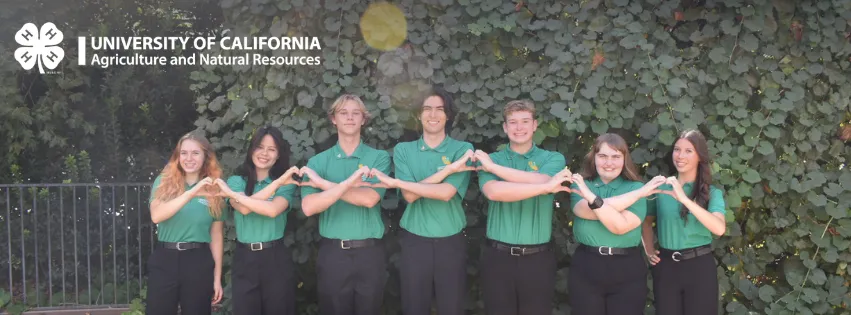
4-H in California
As early as 1912, the University of California encouraged the formation of boys' and girls' agricultural clubs in rural areas and collaborated with school districts to organize them. In 1913, the forerunner of 4-H was founded in California – an agricultural club at the College of Agriculture in Davis. By 1914, 84 high school agricultural clubs were reported in California. By 1917, 2,716 participants in 208 high school agricultural clubs were engaged in projects under the direction of the University of California.
In 1928, "4-H" appeared in California reports of youth work. In the 1930s, over 10,000 youth in California 4-H clubs were developing skills through individual projects and learning leadership and civic responsibility through community improvement projects. In 1953, a state 4-H club leader was assigned by the University Extension. 4-H programs were reorganized with a widened project base aimed to reach a broader audience than just rural boys and girls. Today, the University of California 4-H Youth Development Program (California 4-H) is open to all youth ages 5 to 18 in every county in California.
California 4-H believes in the power of young people. We see that every child has valuable strengths and real influence to improve the world around us. California 4-H offers opportunities to learn and use skills in communications, leadership, STEAM (Science, Technology, Engineering, Agriculture and Math), healthy living and civic engagement.
All are welcome here
California 4-H is committed to creating spaces where all young people can grow and thrive.
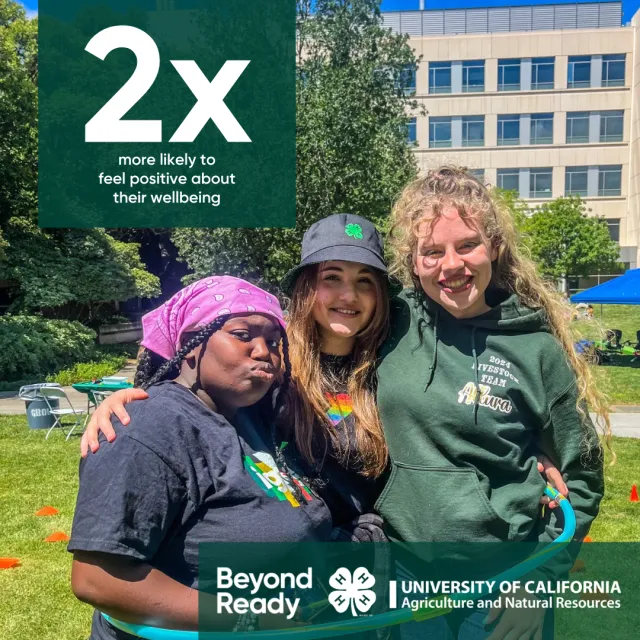
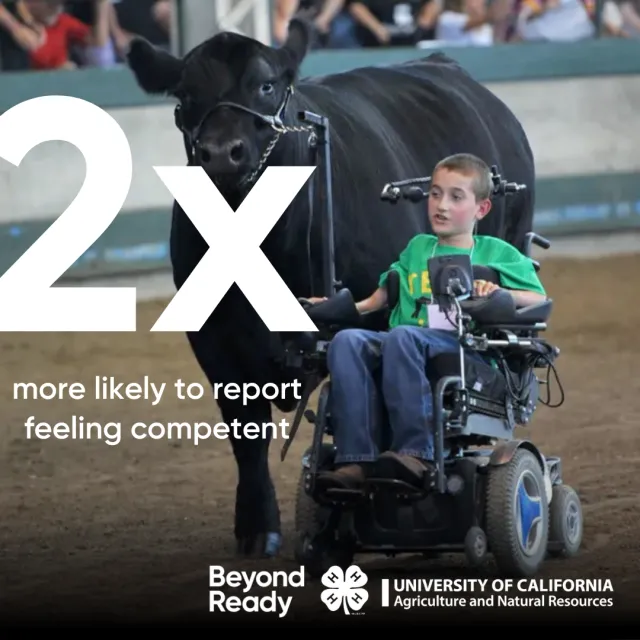
Our Vision
A world in which youth and adults learn, grow, and work together as catalysts for positive change.
California 4-H Strategic Plan 2023-28
The CA 4-H Strategic Plan 2023-2028 focuses on three interconnected themes to advance California 4-H towards high quality, equitable youth development programming and applied research over the next five years.
The three themes are:
- Strengthen access, equity and belonging in 4-H programs.
- Increase opportunities for meaningful youth engagement in high quality 4-H programs aligned with the 4-H Thriving Model of Positive Youth Development.
- Advance youth development research and extension.
The following areas were identified to support advancing the three themes:
- Grow financial stability.
- Improve communication and brand awareness.
- Reimagine volunteer management.
- Streamline administrative procedures.
Learn more about the nation's largest youth development program!
4-H empowers nearly six million young people nationwide with the skills to lead for a lifetime. 4-H is delivered by the Cooperative Extension system, a community of more than 100 public universities across the country. For more than 100 years, 4 H has welcomed young people of all beliefs and backgrounds, giving kids a voice to express who they are and how they make their lives and communities better.
4-H Pledge/Promesa 4-H
In 1927, the 4-H Pledge was adopted at the first National 4-H Camp (now called the National 4-H Conference) in Washington, D.C.
I pledge...
My head to clearer thinking,
My heart to greater loyalty,
My hands to larger service,
My health to better living
for my club, my community,
my country and my world.
Spanish
Prometo usar mi mente para pensar con más claridad,
mi corazón para ser más leal,
mis manos para ser más servicial,
mi salud para cuidarme más,
por mi club, mi comunidad, mi país y mi mundo.
Translated by Dr. Lisa Lauxman, National 4-H Foundation
4-H Motto
"To Make the Best Better"
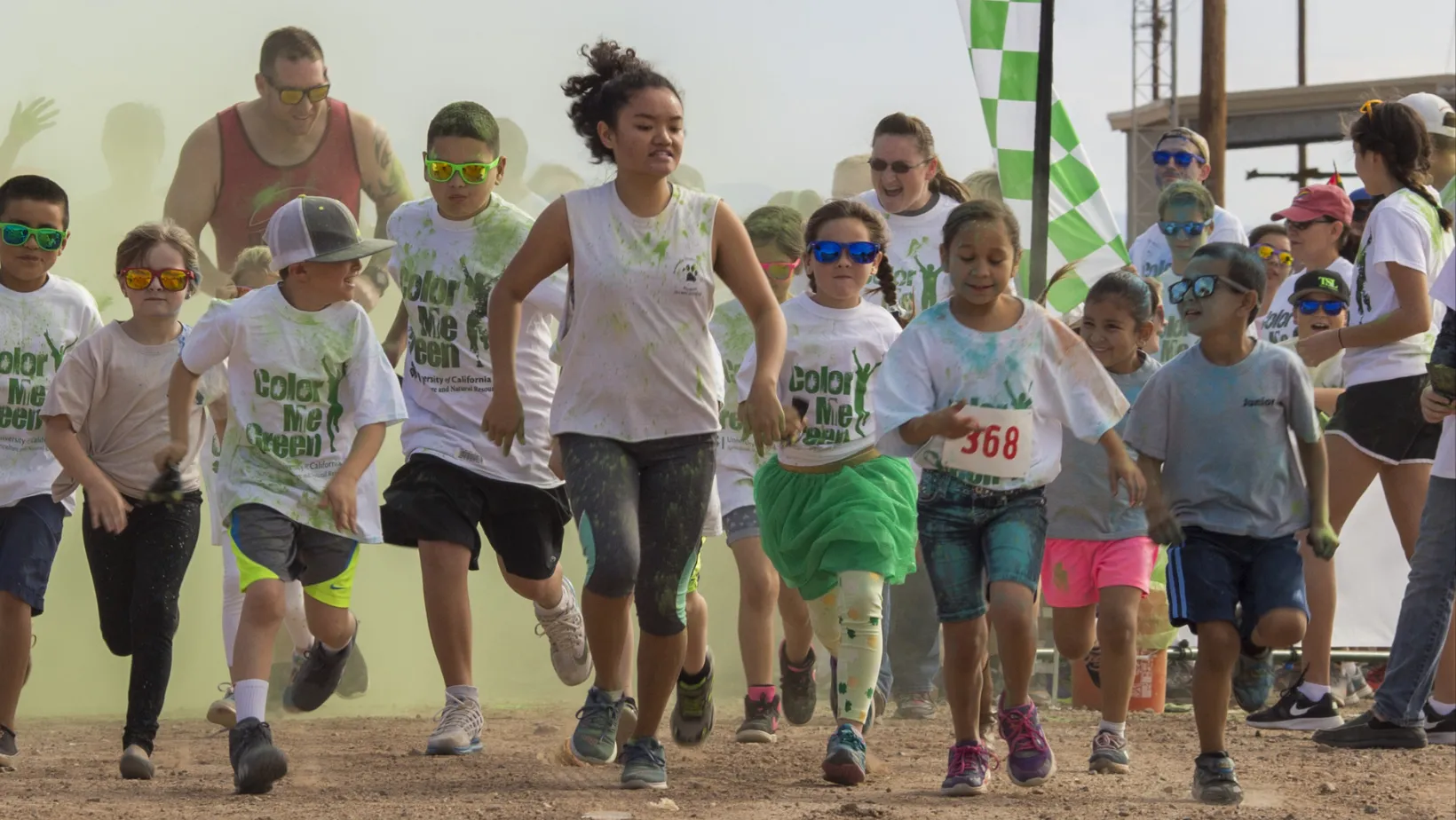
4-H Name and Emblem
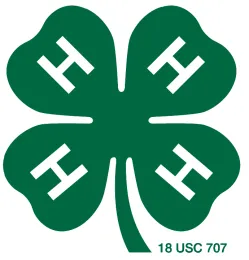
The 4-H Emblem is the national symbol of Cooperative Extension’s 4-H program supported by the United States Department of Agriculture (USDA).
The official emblem is a green clover with white H's - the 4-H colors. The 4-H emblem symbolizes the aim and desired results of effective learning for each individual. The 4-H name should be displayed as "4-H" and youth in 4-H can be referred to as "4-H'ers," (not"4-Hers" or "4hers").
What do the H's stand for?
Programming
The University of California 4-H Youth Development Program promotes hands-on, experiential learning for all youth ages 5-19. Our 4-H programs are delivered locally through the county University of California Cooperative Extension (UCCE) offices:
- Community clubs
- 4-H Camps
- Afterschool clubs and programs
- Military partnership programs
- Events & conferences
Programs vary by county. The UCCE offices are managed through the University of California Division of Agriculture and Natural Resources (UC ANR). UC ANR has been extending research-based information to community partners, farmers, individuals, collaborators, councils and schools for over 100 years.
4-H offers limitless opportunities for friendship, growth, fun, and development. By engaging youth and adults in meaningful partnerships, 4-H helps young people to reach their full potential as competent, confident, leaders of character who contribute and are connected to their communities.
Enrollment Eligibility
All 4-H youth (ages 5-19) must enroll annually (July 1 through June 30). Enrollment is conducted by the 4-H Club and County 4-H Office. Projects offered vary by club from year to year based upon adult volunteer availability. Enrollment for the 4-H Youth Development Program in Kings County will be conducted using ZSuite, a web-based system used to enroll youth and accept applications for adults in the California 4-H Youth Development Program.
Primary Members (also called Cloverbuds or Mini-members) – Must be 5 years old by December 31 of the program year. Primary members cannot enroll in large animal projects. Youth enrolling or turning nine after December 31 must participate as a Primary Member until the end of the program year (June 30).
4-H Members – Must be 9 years old by December 31 of the program year and may continue in the program until the end of the calendar year (December 31) in which they become 19 years of age.
4-H Adult Volunteers – An individual must be eighteen (18) years or older to become a 4-H adult volunteer. A 4-H adult volunteer cannot simultaneously be a 4-H member. Chaperone duties may be assigned to 4-H adult volunteers upon approval of the 4-H YDP staff. A chaperone is a 4-H adult volunteer at least twenty-one (21) years of age. He or she has the responsibility of a delegation of youth at a 4-H YDP event or activity. The event usually lasts more than twenty-four (24) hours with an overnight stay, and often involves travel.
